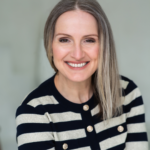Listen to the full interview:

1.Can you give the readers a background on who you are and what you do?

“I started my full-time business in 2021 in the middle of the pandemic. I help experts in micro businesses design, build, and run sustainable businesses. I left corporate in 2021, not really knowing what I was going to do. I’ve done lots of operational things and leadership. I just figured I’d make money somehow because I was just so tired of my toxic work environment. And the more I learned about business building, the more I realized there’s actually very little foundation education on how to design, build, and run a business out in the world. So, I said, “Okay, I’m going to teach you this program. I’m going to sell you this thing, but I’m going to help you with your mindset.” There’s a lot of work on how to build tech startups and more traditional businesses where you’re not selling your expertise. But there’s very little practical education for experts. And so that’s why I have started crafting that as my work in the world.”

2. Let’s go back to when you were in that corporate environment. Whether it’s the actual environment, your skills aren’t being utilized, or your value isn’t being recognized, what did you notice was happening for you that got you to figure out it was time to make a leap?

“So, the first leap happened when I was working at Nike. I was running the women’s training, demand, and supply department. (How many sports bras are we going to sell to Dick’s Sporting Goods? How many shoes are we going to sell at a Footlocker in our category? Therefore, what do we need to buy?) I was a director level at that role. This was in 2014. I got promoted to director of inventory management, and I realized two things.
1. This was a two-person job that was done by one person.
I walked into the role saying I needed an extra head count.
They’re like, ‘Sure, we’ll give you one.’
That didn’t happen. It was not at the level I needed.
2. I looked at my boss, my leader, and saw that the person did nothing.
His role was political management, PowerPoint manipulation, and going to meetings. And it was the meeting before the meeting, before the meeting to inform the leader with the senior leader meeting to have the debrief afterward. And his job was just going to meetings.
And I’m like, all right, well, if I’m not going to get the resources for the work I need to do at my level, then I don’t want his job. So, I was stuck. I didn’t know how to move from there because I loved being connected to the work, but I felt I was being taken advantage of and my health was taking a hit. I knew I couldn’t move up and I didn’t want to move across because it’s just the same patterns in different roles. By that time, my life was my career, so I knew I had some stuff to blow up because it wasn’t working for me anymore.”

3. What did you blow up? What happened next?

“So first, I raised my hand, and I said, ‘Get me out or I’m getting myself out.’
For a year I was helping to build out a new process and I was shopping this deck around to all the different geographies and all the different people. I didn’t really have hard deliverables. It was the most boring job I’ve ever had, but it gave me time to recover.
At that point in time, I got a holistic nutrition certification because I needed to have my life not be completely enmeshed with my work. And that’s when I decided I want to become a life coach. But most importantly, I moved to a lateral job where I was not challenged. It was great for recovery but bad for intellectual stimulation. So, I had three options:
- I can be at a job where I’m going be overworked and overwhelmed because they’re going to take advantage of my talents and gifts and not resourcing me properly.
- I can take a boring job that is literally just taking up space and pretending to do work.
- Or I can take a job I can get promoted in, and be completely removed from the actual day-to-day work, which is what I love to do. I love to be involved in the details.
So, once I figured out how to get my life unmeshed from my career by investing in a hobby, by really learning more about nutrition, my body, who I was as a human being by going through life coach training, that’s where I noticed there was no future for me there.”

4. What helped you find clarity during that valley moment?

“I knew I had hit my rock bottom when I had panic attacks for a week in my boss’ office. It was the week before Thanksgiving. I knew something wasn’t okay. The first 10 years of my career was consulting. There was no luxury to slow down. It was just power through. I got to the point where powering through wasn’t an option anymore. So, I ended up taking a week off of work. I happened to be living in Portland, Oregon at the time, which is a hotbed for the woo-woo side of the world. I went to Powell’s Books, looked at their events board, and saw a mind, body, spirit expo. I was at the point of being in pain, so I just wanted to do things that were not in pain. So, I decided to go to the mind, body, spirit expo. I signed up for a meditation class. I met my first tarot reader. I was lucky enough that the universe gave me a sign that said, ‘Go do this thing.’ And that was where I was given a path to follow. I didn’t know where it was going to lead, but that was the first sign of direction.”

5. How did you discover that business systems and modeling were your area of focus?

“At my next job, I came in knowing that there was this separation between me and the company. I’m going to come in, do good, solid work, but I’m not going to get super enmeshed. But when I was there, I realized that I ended up in the middle of a system cutover. We cut over our back end, our ERP system, so I was leading the planning department. It meant our planning software was going to break. It was going to be obsolete.
So, they’re like, ‘Jessica, you’re the only person who can lead us through the transition.’
So, I had to design a future org, hire consultants, lead the project, manage a demand and supply management system, design, test, process develop, etc. So, I went on a three-year journey to orchestrate an entire transformation of my department. I saw the vision. I held it. I was sitting in an Excel sheet doing testing when I thought: very few people in very few roles will let you both have the vision and the strategy plan, but also let you get to do things. That’s when I discovered this is what I was meant to do. I was meant to see the big picture and uniquely hold the vision and details in a way that not a lot of people can. But I didn’t want to do that for big business anymore. I wanted to do that for small businesses.”

6. Why do you think owning your expertise is so important? How does it help people in their leadership and career?

“I think knowing your expertise has a lot to do with knowing your temperament:
- Do you like short-term projects or long-term projects?
- Do you like to teach?
- Do you like to perform?
- Do you like to show up on video or do you like to write?
A lot of times we’re just presented options without thinking through ‘What am I best suited for and how does my Brilliant Difference show up? And then how do I design a business that supports my clients?’”

7. Where would you point people to help them uncover their expertise?

“I think it’s looking at the things that light you up and the things that drain you, almost like a plus-minus list. It’s really also answering, what if this is something you don’t like because you’re not resourced for it? How much is it because you don’t have the right team member under you and how much is it where you don’t want this at all? And so, ask yourself: What are the things I’m enjoying doing? What are the things I’m not enjoying doing? Really look for those patterns and then don’t be afraid to own it. Say, ‘How can I shape my career, or my business, based on those things versus what do I need to shave off to fit into what they’ve told me the boxes are?’”
Interviewer

Finka Jerkovic
Leadership Coach and Founder of Finka Inc.
With 25+ years in leadership and sales and the financial services industry, she has witnessed the power of recognizing and celebrating people’s unique strengths and differences (a.k.a Brilliant Differences™) within a workplace. When everyone’s unique talents are appreciated and people work together using them, that’s when the real magic of business growth happens. Fast forward 10 years. Finka has established programs that help corporate companies grow their businesses by tapping into the full potential of their teams, so they can clearly define their strengths, value their differences, and perform at their best.
Interviewee

Jessica Lackey
Founder of Jessica Lackey Consulting
Jessica Lackey is a strategy and operations advisor who blends business strategy, practical application, and a human-centric approach to create sustainable businesses. With a background in corporate leadership, McKinsey & Company consulting, and a Harvard Business degree, Jessica knows a thing or two about hustle culture and what it feels like to judge success by the bottom line…at all costs. Now, she combines her deep experience in consulting, Fortune 500 operations leadership, and coaching to help businesses grow without sacrificing the well-being of their clients, team, and community.


